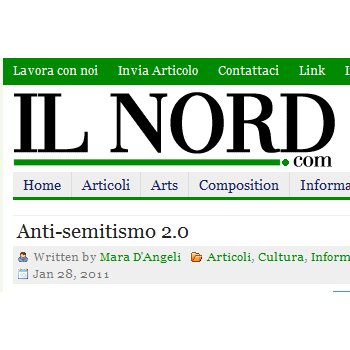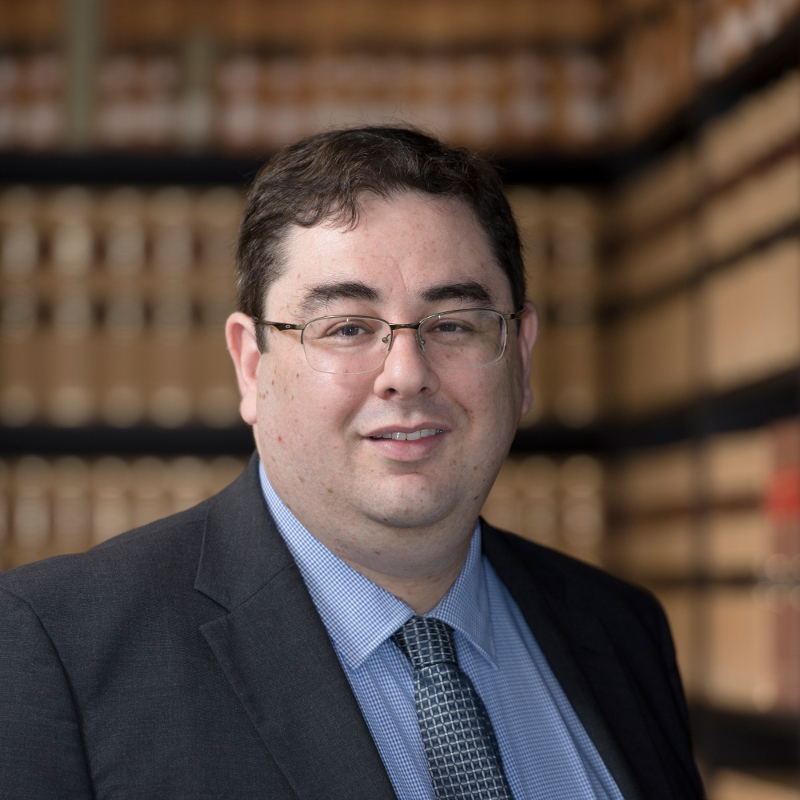Source: Mara D’Angeli, Anti-Semitism 2.0, Il Nord, 28 January 2011
 Never underestimate the Internet. We soon hear of the importance and potential of this medium, but the risks of the medium are too often unknown or unexplored. The Internet changes so fast that somethings will inevitably get out of hand. Holcoaust Memorial Day uses formal education, books, films and conferences, all mediums are used to remind us not forget. But the antisemitic propaganda still finds its way to exposure, it refuses to be silenced. It has become second nature on the web more than sixty years after the Shoah. Today we realize that deleting an antisemitic posted form Facebook is not as simple as removing graffiti from a city wall. The seriousness of the gesture combines with the seriousness of the impact it causes. Facebook posts can be semi-permanent, visible to all, and it is difficult to intervene: this is the new weapon used by those who even today claims to promote racist propaganda.
Never underestimate the Internet. We soon hear of the importance and potential of this medium, but the risks of the medium are too often unknown or unexplored. The Internet changes so fast that somethings will inevitably get out of hand. Holcoaust Memorial Day uses formal education, books, films and conferences, all mediums are used to remind us not forget. But the antisemitic propaganda still finds its way to exposure, it refuses to be silenced. It has become second nature on the web more than sixty years after the Shoah. Today we realize that deleting an antisemitic posted form Facebook is not as simple as removing graffiti from a city wall. The seriousness of the gesture combines with the seriousness of the impact it causes. Facebook posts can be semi-permanent, visible to all, and it is difficult to intervene: this is the new weapon used by those who even today claims to promote racist propaganda.
On the occasion of the January 27, Holocaust Memorial Day, it is natural to reflect on what this “memory” is really protected. As claimed by Andre Oboler, a young Australian expert coordinator of the Internet Community Engagement Project at the Zionist Federation of Australians, the racist views on the Web find fertile ground on which to grow in way that is now impossible in the real world. “Hidden behind anonymity or a nickname, young people and adults can make excuses for the failure of Fascism and Nazism and promote a revival”. Particularly involved in the challenge to stop this new form of antisemitism is Fiamma Nirenstein, vice president of the Foreign Affairs Committee of the Chamber of Deputies. There are many ideas disseminated via the Internet, said Dr Nirenstein, she lists the Jewish conspiracy to take over the world, the spread of false history of the Protocols of the Elders of Zion, and aberrant forms of anti-Israeli propaganda as some examples.
The problem stems from the great difficulty by the police to manage the dissemination of these messages. The Internet is now the voice of the people, the chance for everyone to express their views and any form of censorship on it becomes a delicate step that from the point of view of many, would be to undermine the spread of freedom something that by its very nature must be guaranteed. Even more tricky is the question of sites registered abroad, for which there must be judicial cooperation among states before a site can be closed. The elimination is still a future problem: the difficulty right now is in identifying the guilty, today many remain unpunished.
Concern with the problem is evidenced by the Education Minister Gelmini , who, in these last few days moved his proposal to further highlight the study of twentieth century history in schools, with particular attention to the genocide of the Jewish people and contemporary Judaism in its various aspects. The Minister also directed the government in steps he hopes will avoid new anti-racial incidents within the universities in the future, as happened during “apartheid week” last year, in which two Italian universities participated.
In addition to the main sites that contain a wide variety of information such as Effedieffe, Terrasantalibera, Italiasociale, there are also “conspiracist” who read the historical events under the clouded lens of distortion, and finally the “deniers” engaged in showing how the Holocaust was just nothing but a big scam.
The Internet is not a secondary form of communication. It is consulted much more than books, and more leisure time in spent online than watching television. The information online is increasingly within the reach of children, making them the first victims of the negative influence of subtle racist campaigns. Devoid of historical memory and without grandparents to tell of a war that happened only sixty years ago, children are the first who must be addressed and educated to know what happened. It is only by focusing on the children that the “memory” will be truly preserved and protected from false information, ignorance and the sick minds that produce the hate found on more than 8 thousand racist sites that exist despite current laws.
Italian Original:
Mai sottovalutare Internet. Poco sentite nella loro reale importanza e potenzialità, le possibilità del mezzo rimangono troppo spesso sconosciute o inutilizzate. Si rimane così improvvisamente spiazzati di fronte a qualcosa che è inevitabilmente sfuggito di mano. La Giornata della memoria, l’ istruzione scolastica, i libri, i film e i convegni a tema: tutto al solo scopo di non dimenticare. Ma la proprosta antisemita ha comunque trovato il suo sentiero per non essere taciuta. Questa strada, tutt’altro che secondaria è proprio il Web. A più di sessant’anni dalla Shoah ci si accorge che una scritta antiebraica postata su Facebook non è così semplice da cancellare come quella trionfante su un muro della città. Alla gravità del gesto si aggiunge così la gravità delle conseguenze. Messaggi quasi permanenti, visibili a tutti e sui quali è difficile intervenire: è questa la nuova arma utilizzata da chi ancor’oggi pretende di fare della propaganda antirazziale.
E’ proprio in occasione del 27 gennaio, la Giornata della memoria, che viene spontaneo riflettere su quanto questa “memoria” sia realmente protetta. Come sostiene Andre Oboler, giovane esperto australiano coordinatore del programma Community Internet Engagement della Federazione Sionistica Autraliana, l’opinione razzista sente il Web come terreno fertile e permissivo sul quale poter esprimersi, cosa diventata oramai impossibile nel mondo “reale”. Armati d’anonimato o nascosti dietro nickname, giovani e adulti praticano così indisturbati apologia di fascismo e nazismo. Particolarmente impegnata nella sfida a questa nuova forma di antisemitismo è Fiamma Nirenstein, vicepresidente della commissione esteri della Camera dei Deputati. Sono tante le idee divulgate via Internet, spiega la donna, dalla cospirazione giudaica per impadronirsi del mondo, la diffusione del falso storico del Protocollo dei savi di Sion, a forme aberranti di anti-israelismo.
Il problema nasce dalla grande difficoltà da parte delle forze dell’ordine di gestire la diffusione di questi messaggi. Internet rappresenta oggi la voce del popolo, la possibilità per tutti di esprimere la propria opinione e ogni forma di censura su di esso diventa un passo delicato che, dal punto di vista di molti, equivarrebbe a minare la libertà di diffusione che la natura stessa del mezzo vuole garantire. Ancor più ostica è la questione relativa ai siti registrati all’estero, per i quali è prevista una cooperazione giudiziaria tra gli stati per far chiudere la pagina Web. Una volta ottenuta l’eliminazione resta comunque un ulteriore problema: la difficoltà nell’individuare i colpevoli, che, in molti casi rimarrebbero impuniti.
Non indifferente alla problematica si dimostra anche il Ministro dell’Istruzione Gelmini, che, proprio in questi ultimi giorni muove la sua proposta di valorizzare maggiormente all’interno delle scuole lo studio della storia del Novecento, con particolare attenzione alla genesi del popolo ebraico e all’ebraismo contemporaneo nei suoi vari aspetti. Il Ministro si è rivolto anche al Governo nella speranza che si dimostri in grado, in futuro, di evitare di nuovo episodi anti-razziali all’interno degli atenei, così come successo durante la settimana dell’apartheid lo scorso anno, a cui due università italiane avevano partecipato.
Accanto ai principali siti che contengono in merito l’informazione più ricca e significativa come Effedieffe, Terrasantalibera, Italiasociale, ci sono quelli “cospirativisti” che leggono gli avvenimenti storici sotto la lente offuscata di un’informazione sbagliata e infine i “negazionisti” impegnati nel dimostrare come l’olocausto sia stata soltanto una grande truffa.
Internet non è affatto un sentiero secondario. Consultato molto di più che i libri e passatempo ormai preferito alla televisione, le informazioni che passano al suo interno sono sempre più alla portata di mano dei ragazzi, rendendoli le prime vittime dell’influenza negativa di subdole campagne anti-razziali. Privi di memoria storica e spesso di nonni che gli raccontino di una guerra avvenuta solo sessant’anni fa, sono loro i primi a dover essere indirizzati e istruiti per sapere che cosa è successo. é solo puntando sui ragazzi che la “memoria” verrà veramente preservata e protetta da una falsa informazione, dall’ignoranza e da un pensiero malato che, forte di più di 8mila siti a tema, ha ancora il coraggio d’esistere.
